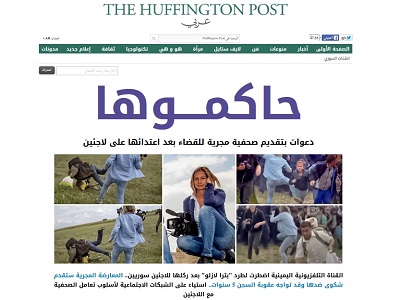Huffington Post Arabic and the Absurdity of ‘Liberal’ Expectations

Huffpost Arabic is rather humane in its approach to politics.
By Ramzy Baroud
What does it mean to be a ‘liberal Arab’? Even in the West, definitions of the ‘liberal’ vary.
In the American context, the demarcation of the ‘liberal’ overlaps cultural and political lines. Republicans use the term in a derogatory way to describe their opponents. Watch ‘Fox News’ to understand. (On second thought, please do not watch Fox News!). Europeans are hardly keen on the term altogether. Many often use the term ‘progressive’ to liberate the ‘liberal’ from its political baggage and imprecise cultural insinuations.
So when the newly-launched Huffington Post Arabi – the Arabic edition of the news and entertainment portal Huffington Post – was fiercely attacked for not being ‘liberal’ enough to match the ‘liberal left’ views of the mother portal, it left me puzzled.
This is a title in the Independent, which was, more or less, mirrored by other publications:
“Huffington Post causes outrage after Arabic edition criticizes gay people, atheists and selfies.”
The main photo with the article was that of former Tunisian President, Mohamed Moncef Marzouki (2011-14), perhaps one of the most progressive and prominent Arab politicians of all time, since he also presided over Tunisia’s democratic transition following its 2010-11 peaceful revolution.
Looking befuddled in a low resolution photo, with an unrelated caption (neither the caption nor the article mentions the former Arab President’s name) that reads: “The Huffington Post has been accused of letting ‘its Arabic site disgrace its brand’.”
I spent some time seeking to understand the ‘outrage’ mentioned in the ‘Independent’ and other publications. Some readers’ criticism of some content published in ‘Huffington Post Arabi’ was justified. Their opinions, in this case, were consistent with mine, although I am sure that such opinions are not at all consistent with the views of others. But that is the nature of any opinion.
Frankly, I find ‘selfies’ distasteful and I share the views of a writer in Huffington Post Arabi that Arabs should not simply mimic every Western phenomenon which many Westerners, themselves, may find objectionable.
It also happens that the American Psychiatric Association (APA) also agrees, as it recently classified ‘selfies’ as a mental disorder, giving it an official name: ‘selfitis’. It is defined as “the obsessive compulsive desire to take photos of oneself and post them on social media as a way to make up for the lack of self-esteem and to fill a gap in intimacy.”
The ‘Independent’, too, ran multiple stories on the harm of ‘selfies’, including this recent story on August 27: “Selfies cause head lice, US paediatrician warns.”
If one is to judge the ‘Independent’, which has produced some of the finest journalism in Britain regarding the Middle East in recent years, it would not be over its own strange obsession with ‘selfies’, but over running sensational stories about new Arabic media’s supposed failure to live up to some ‘liberal left’ western expectations.
Of course, the issue has little to do with the freedom to take ‘selfies’ or, at least in the minds of some, also little to do with the rights of gays and atheists. (The opinion piece that was criticized from being homophobic was taken down and an apology regarding the matter was issued.)
The issue is rather political because some of those affiliated with the project are accused of being members of the Muslim Brotherhood. Naturally, this stalks fear that the editorial line will follow suit.
In case you haven’t noticed, there is a media war in the Arab world that is as dirty as that of the actual wars raging from Syria to Yemen. The moment a new media venture is announced, each side determines its position from those behind the project. If its editorial line is not of the liking of this group or the other, an organized media war is instantly launched, using every dirty trick to defame, slander and vilify.
The attacks are often mounted using the same usual suspects, for example, the likes of JihadWatch.org and Breitbart.com:
“The two men leading Huffington Post’s new Arabic-language site have in the past been accused of having direct involvement with the Muslim Brotherhood and radical clerics; and one has openly expressed conspiratorial views that have been interpreted as having an anti-Semitic connotation.”
Others get involved, perhaps unaware of how their views could be utilized in the sentential media war.
‘Buzzfeed’, not particularly known for its high journalistic standards, was one of the first to attack ‘Huffington Post Arabi’, again using sentential headlines, imbalanced text and irrelevant photos.
Tom Gara of ‘Buzzfeed’ also drew similar conclusions – that ‘Huffington Post Arabi’ is “heading in a different direction” from the “liberal, progressive politics and embrace of popular culture” offered by the English edition. These substantial conclusions were mostly drawn from the single article that warned of a war against Islam, and made a fleeting reference to gays in Egypt.
Of the 14 different offshoots of the ‘Huffington Post’, its Arabic edition must be the most scrutinized. Its critics wasted no time in drawing massive conclusions about the entire editorial line of the Arabic website, based on an article and alleged affiliation of some of its managers to a political party that was forced out of power in Egypt; accusations which are mere allegations.
The politics behind much of the attacks (especially by Arab twitter users and some in the media) notwithstanding, what puzzled me most is the assumption that being a progressive or liberal Arab should automatically mean a word for word translation of the political and cultural norms of Western culture.
This is the heights of intellectual hubris, and no self-respecting and truly progressive Westerner should hold such expectations.
I spent some time browsing both websites, ‘Huffington Post Arabi’ and the English version to find out for myself whether the ‘outrage’ at Huffington Post Arabi’s supposed regressive coverage is justified.
There was much in the English version that was worth reading while other content was, frankly, of no use to me – or even objectionable altogether. I disdain the sexual objectification of women, even if done with a ‘liberal’ agenda in mind. I will continue reading it, however, simply because I trust the publication’s overall editorial agenda.
The Arabic was more relatable and unmatchable in terms of its authentic understanding of the Middle East region; rather humane in its approach to politics and, in some ways, progressive, although less ‘activisty’ than the English edition. That was refreshing. However, some of the content was of no use to me and a few of the opinions were quite misguided, in my view.
Aside from the article mentioned above, I hardly noticed a war on freedom, gays and atheists.
But that said, shouldn’t ‘Huffington Post’ (Arabic, English and all other editions) allow for views that are not consistent with one’s own understanding of being leftist, liberal, or progressive?
Why shouldn’t the Arabs face their demons heads on? Debating, using their own language and cultural references, freedom, democracy, human rights, women’s rights, gay rights, minority rights, role of religion in politics, authoritarianism, globalization, even the very role of media in politics?
‘Buzzfeed’, the ‘Independent’ and ‘Jihad Watch’ should not determine the limits of Arab political thought or cultural norms. Nor should we expect the Arabic edition of ‘Huffington Post’ to duplicate the English version, in which case an Arabic edition would be unnecessary.
However, what one should expect from ‘Huffington Post Arabi’ is to challenge the media polarization and operate outside the destructive framework of the media war underway in the Middle East.
‘Huffington Post Arabi’ should open an equitable platform for ideas and encourage debate, bringing the arguments of all sides to the fore, allowing its readers to decide for themselves, not to appease any particular definition of what a liberal is or is not; but to espouse urgently needed dialogue at a time of senseless wars and protracted conflicts.
– Dr. Ramzy Baroud has been writing about the Middle East for over 20 years. He is an internationally-syndicated columnist, a media consultant, an author of several books and the founder of PalestineChronicle.com. His latest book is My Father Was a Freedom Fighter: Gaza’s Untold Story (Pluto Press, London). His website is: www.ramzybaroud.net.










































1 Comments
Jim Watkins
September 12, 2015 at 1:49 amI wish to thank you for your integrity and thoughtfulness in your analysis. As one, by accident of birth, was born into one of the most “free” places on the planet and a one who has spent many years trying to understand Arabs, Arabic thinking, systems of faith, history and realpolitik in these times. You make a most honest effort to forward fairness of view and possible futures.
Even in my country rights have been translated into privileges that can and have been withdrawn at the will of the state and elites. I am hoping that Huffington Post Arabi is translated into English that the current Arab thoughts and views are available to us who try to understand.